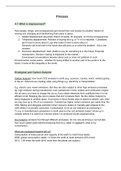Class notes
Week 4: Process
- Course
- Sust1400 (SUST1400)
- Institution
- Dalhousie University (Dal )
Notes on lectures from week 4: process cluster Andrew Bergel and Will Langford, What is Displacement?, Andrew Bergel, Carbon and Ecological Footprints, Steven Mannell, Economic Displacement and Environmental Justice, Will Langford, Wilderness, Andrew Bergel, Colonization and the Rise of M...
[Show more]



